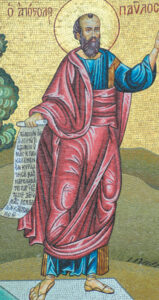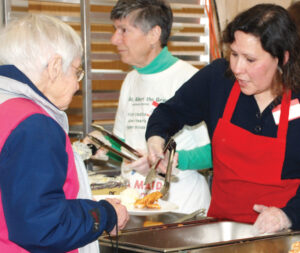
A mosaic honors the apostle Paul in Berea near Thessalonika in Greece.
Jesus continues to teach in the temple courts, no longer confronting temple officials or other teachers but talking to his own disciples. Jesus praises the scribes and Pharisees with a critical twist. “Do and observe everything they tell you,” Jesus urges his disciples, because these teachers of the law occupy the seat of Moses. He then adds a big BUT. “But do not follow their example. They do not practice what they preach.”
Commonly Christians stereotype the scribes and Pharisees as the bad guys in the gospels. Passages such as Sunday’s gospel feed their reputation for hypocrisy. Throughout Matthew’s chapter 23, Jesus criticizes Pharisees, calling them “blind guides” and “whited sepulchers.” It’s a chapter of warnings aimed at those who love being first, being praised, being important.
The warnings take the literary form of woes. A woe is the opposite of a beatitude. A beatitude begins, “Blessed are the…” and then describes who is blessed in God’s eyes. A woe indicts, “Woe to you, scribes and Pharisees, blind guides, who lock people out of the kingdom.” A contemporary example might be, “Woe to you, ecologists, who drive to work when you could easily take the bus.”
Scholars today urge more sympathy for the Pharisees. Individual Pharisees may be hypocrites but as a group they are the village religion teachers of Jesus’ time. They help the people understand what the Law of Moses asks of them in their daily lives. They believe in updating the law through examining cases and setting new precedents to fit present situations.
As a reforming teacher, Jesus is more like the Pharisees than any other religious group. He, too, is a teacher of the people. So why such harsh words for them?
Matthew hears in Jesus’ words an important message for Christians of the A.D. 80s. Some must be claiming more importance than others in the house churches in which the early communities gathered. Perhaps roles are creating rank in the household of Christ.
More than 50 years after Jesus’ death and resurrection, the early ideals of sharing goods and extending hospitality in mutual love have perhaps dimmed. Christians face the future without the temple and without Jesus’ first eyewitness leaders. Jesus’ words remind them that teachers and leaders in Jesus’ household are servants of all, not higher ranking officials.
The responsibility of witnessing to Jesus’ good news goes not just to a few but to all in the pew. Our lives, not just our words, must teach.
- How did you learn to be a good Catholic?
- What does how you live teach others about being a follower of Jesus?
At this point in his gospel, Matthew is readying hearers for the last judgment. The early Christians who identify with both their Jewish identity and their fidelity to Jesus’ teaching must decide what they need to hold on to and what they can let go.
Today we ask the same question. Over 20 centuries the Church has evolved as an institution with roles, robes, and ranks. Yet our model is Jesus Christ, who identifies with the least and washes his friends’ feet before his last supper as a servant. In concluding Sunday’s gospel, Jesus calls us to humble service, not station and status. In the community that gathers in Jesus’ name, the greatest serve the rest; the humble are exalted.
The Second Vatican Council recognized that baptism calls every Christian to holiness and to live the mission of Jesus in the world. The bishops of the council affirm that “Christian Tradition makes progress in the world not only through the teaching of the bishops who succeed the apostles but through the prayer and pondering in our hearts of every believer and through our experience of spiritual realities” (Dei Verbum #8).
As may have happened with Matthew’s community, the ideals of Vatican II have dimmed—but interest in national and diocesan synods is a sign of growing willingness among the people of God to take responsibility for Jesus’ message to our world. Pope Francis seeks to involve the people of God in the work of the Church.
- How does rank or privilege insulate you from wider experience of the whole people of God?
- How have you participated in synod preparation in your parish and diocese? What are your hopes for the synod process in the Church?

In Sunday’s second reading, Paul describes himself as the mother of the Christian community at Thessalonica. “While we were among you, we were as gentle as any nursing mother fondling her little ones. So well disposed were we toward you, in fact, that we wanted to share with you not only God’s tidings but our very lives, you had become so dear to us” (1 Thessalonians 2.7). This mother image expresses Paul’s total commitment to those he has given birth in Christ.
In Matthew’s gospel, Jesus cautions against calling anyone but God, father. Apparently, the father image in Matthew’s time, as in our time, carries not only the association of care and commitment but of authority and headship. Paul and this Sunday’s gospel speak against a hierarchy of roles in the Christian community and for equality and mutual service.
The Lenten fish suppers in our parish help us see one another serving. The man who trains altar servers also supervises the coffee pots. A man whose grandmother taught him how to make pies makes a dozen for the Friday night events. An experienced core group fries the fish. Kids wind napkins around silverware. Jesus’ whole message is to serve each other. People’s willingness to serve lights the way to the God we are seeking.
- What has sustained you in the practice of serving others? What has deterred you?
